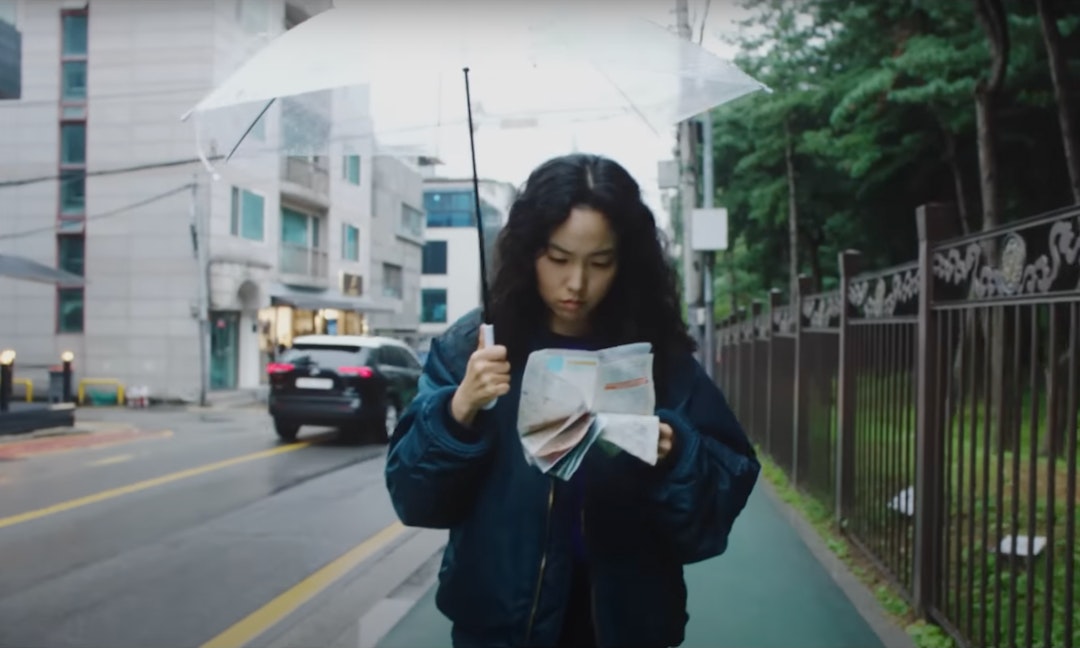
Freddie (Park Ji-min) was given up for adoption as an infant and is now back in Seoul, speaking no Korean but a lot of French and some English. In her first scene, she checks into a hotel, but she doesn’t seem very certain about it. Serendipitously, receptionist Tena (real-life literary translator Guka Han) speaks French. She becomes Freddie’s main contact and interpreter.
That Tena and her friend Dongwan (Son Seung-Beom) speak French is unusual enough for the film to offer an explanation (her mother’s a French teacher, he majored in Franco–Asian comparative literature). But it had to be done, for writer-director Davy Chou is Cambodian French, and Return to Seoul (2022), inspired by the experience of Chou’s friend Laure Badufle, is the Oscars 2023 submission of . . . Cambodia, for some reason.
The language immediately complicates the vibe. English is the lingua, uh, franca, and when Freddie talks to anyone without Tena to translate, we’re always aware of the third-language distortions. Then there’s the cultural issue: France was emphasizing not too long ago that its citizens had no “hyphenated identity,” and that ethnic roots were only an “individual reality.” But for someone like Freddie, who at one point declares, “I am French,” the search for belonging isn’t so simple.
Freddie comes to Seoul to seek her biological parents, though she doesn’t admit it to herself. The sense of cultural alienation we perceive in her lilly-white childhood pictures (herself the sole exception) has molded her spiky, fiercely independent, and electrifyingly chaotic personality, thrillingly interpreted by first-timer Park. Like Wallace Stevens’s jar, she carries her culture with her, pouring her own soju right after Dongwan explains why that’s impolite, and gathering all the restaurant diners together by sheer force of will, Western-style.
Freddie’s cultural forcefield has a boundary, and being expelled can be devastating. Jiwan (Kim Dong-Seok) falls for her after a tryst, and when he drunkenly refuses to take no for an answer, he has to endure Freddie’s flirting with a bar DJ (Park Kug-Hwan) and then krumping on the empty dance floor to Jérémie Arcache and Christophe Musset’s EDM tune “Anybody,” featuring the highly thematic lyric, “you can’t make it alone.” He has no chance in hell.
And when Freddie’s biological father (Oh Kwang-rok) and his family inundate her with guilt and apologies, she cuts them loose, too, with an unceremonious half-wave before diving into a taxi. He proceeds to harass her with texts and emails. When she asks Tena why he doesn’t get the hint, Tena replies, “That’s just how Korean men are.” Indeed, escaping her father’s family is also escaping the patriarchal expectations on full display in their house.
The film then jumps ahead two years (edited by Dounia Sichov) to Freddie the international consultant, back in Seoul as what her boss calls a “Trojan horse.” She’s now in an open relationship with the heavily tatted Kay-Kay (Lim Cheol-Hyun) and deeply ensconced in the underground rave scene; nighttime Seoul gleams with seedy freedom thanks to cinematographer Thomas Favel. She finally hears back from her biological mother, who refuses to see her.
The film jumps ahead again, by five years. Freddie is now an arms dealer with a steady White French boyfriend, Maxime (Yoann Zimmer). They’re in Seoul on business, and she brings him along to a reconciliation dinner with her father. But just as she seems to have settled down, her chaotic side rears its head again: She says to Maxime on the taxi ride back, “I could wipe you from my life with the snap of my fingers” — and repeats it for good measure. Unsurprisingly, he dumps her.
At this point, we’re more than wise to the film’s shtick. Freddie has many faces, but underneath them all is the cultural rootlessness that drives her self-destructive acting out. Her search for some kind of belonging is symbolized by her returning time and again to seek her biological parents in the strange yet familiar land of her birth. The time jumps merely serve to highlight the static psyche underlying her superficial variations.
Yet despite the broad familiarity of the story and character, the specific details fascinate (arms dealer?!), and Park’s nuanced and layered performance, with some layers contradicting others, is never less than attention-grabbing. The cherry on top: Chou keeps one final, thought-provoking twist in reserve.
Return to Seoul is in theaters.
READ NEXT: ‘The Novelist’s Film’ Reveals the Solitude of the Artist
TNL Editor: Bryan Chou (@thenewslensintl)
If you enjoyed this article and want to receive more story updates in your news feed, please be sure to follow our Facebook.







